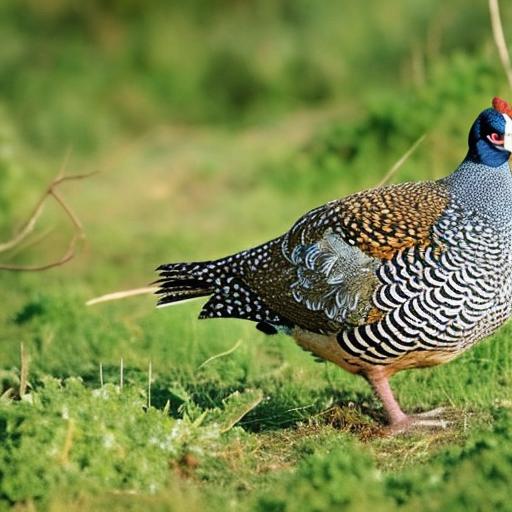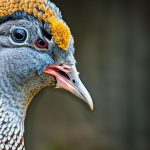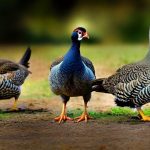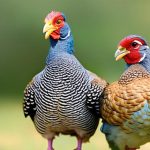Guinea fowl, also known as pintades, are a unique and fascinating addition to any farm or homestead. These birds are native to Africa but have been domesticated and are now commonly kept for their pest control abilities, meat, and eggs. Guinea fowl are known for their loud calls, distinctive feather patterns, and their ability to forage for insects and pests. They are also highly social birds that thrive in flocks, making them a joy to watch and interact with.
Keeping guinea fowl can be a rewarding experience, but it’s important to understand their specific needs and behaviors in order to provide them with the best care. They are hardy birds that can adapt to a variety of climates, but they do require some special considerations when it comes to housing, feeding, and health management. In this article, we will explore the key aspects of keeping guinea fowl, including creating the ideal environment for them, providing proper nutrition, managing their health and disease risks, protecting them from predators, breeding and reproduction, and tips for training and handling these unique birds.
Key Takeaways
- Guinea fowl are low-maintenance birds that are great for pest control and can be kept for meat or eggs.
- Provide guinea fowl with a spacious and secure environment that includes shelter, roosting space, and access to grass and insects.
- Guinea fowl require a balanced diet of commercial feed, grains, and access to insects and greens for optimal health and nutrition.
- Regular health checks, vaccinations, and proper sanitation are essential for preventing diseases in guinea fowl.
- Protect guinea fowl from predators by using secure fencing, netting, and providing shelter for them to hide in.
Creating the Ideal Environment for Guinea Fowl
Guinea fowl thrive in outdoor environments where they have plenty of space to roam and forage. When it comes to housing, they require a secure coop or shelter to protect them from predators and the elements. The coop should have roosting bars and nesting boxes for the birds to rest and lay eggs. It’s important to provide at least 3-4 square feet of space per bird in the coop to ensure they have enough room to move around comfortably.
In addition to a secure coop, guinea fowl also need access to a large outdoor area where they can roam and forage for insects and other food sources. A fenced-in yard or pasture is ideal for keeping guinea fowl safe from predators while still allowing them the freedom to explore and exhibit their natural behaviors. Providing plenty of shrubs, trees, and other natural cover in their outdoor space will also help guinea fowl feel secure and provide them with opportunities for enrichment. Overall, creating a safe and stimulating environment for guinea fowl is essential for their well-being and happiness.
Feeding and Nutrition for Guinea Fowl
Guinea fowl are excellent foragers and will spend much of their time searching for insects, seeds, and other natural food sources. However, it’s important to supplement their diet with a balanced feed to ensure they are getting all the nutrients they need. A high-quality game bird or poultry feed is a good option for guinea fowl, as it provides the protein and energy they need to stay healthy and active. Additionally, offering access to grit or small stones will help guinea fowl grind their food in their gizzards, aiding in digestion.
In addition to commercial feed, guinea fowl can also benefit from supplemental treats such as fruits, vegetables, and mealworms. These treats can be used as a way to bond with the birds and provide them with extra nutrients and variety in their diet. It’s important to monitor their food intake and adjust accordingly based on their activity level, age, and overall health. Providing fresh, clean water at all times is also crucial for guinea fowl, especially during hot weather or when they are laying eggs. Overall, a balanced diet that includes a mix of commercial feed, natural foraging opportunities, and occasional treats will help keep guinea fowl healthy and thriving.
Health and Disease Management for Guinea Fowl
Like all poultry, guinea fowl are susceptible to certain health issues and diseases that can impact their well-being. It’s important to monitor the birds regularly for signs of illness or injury and take proactive measures to prevent common health problems. Providing a clean and dry living environment is essential for preventing issues such as respiratory infections and parasites. Regularly cleaning the coop, providing fresh bedding, and maintaining good ventilation will help keep guinea fowl healthy.
In addition to good hygiene practices, it’s important to provide regular access to dust baths for guinea fowl. Dust bathing helps them keep their feathers clean and free of parasites, which is essential for their overall health. Monitoring their behavior and appearance for any signs of illness or distress is also crucial for early detection and treatment of health issues. Working with a veterinarian who has experience with poultry can provide valuable guidance on preventative care and treatment options for guinea fowl. By staying proactive about their health and well-being, you can help ensure that your guinea fowl live long and healthy lives.
Predator Protection for Guinea Fowl
Guinea fowl are natural foragers that spend much of their time exploring outdoor spaces in search of food. However, this behavior also makes them vulnerable to predators such as foxes, raccoons, hawks, and even domestic dogs. Providing adequate protection from predators is essential for keeping guinea fowl safe and secure. This can be achieved by installing secure fencing around their outdoor space and ensuring that the coop is predator-proof with sturdy locks and barriers.
In addition to physical barriers, it’s important to consider other predator deterrents such as motion-activated lights or sound devices that can startle potential threats. Providing guinea fowl with plenty of natural cover such as shrubs, trees, and tall grass can also help them feel safe and provide additional protection from aerial predators. Regularly inspecting the perimeter of their outdoor space for signs of potential entry points or weaknesses in the fencing will help prevent predator attacks. By taking proactive measures to protect guinea fowl from predators, you can help ensure that they can thrive in a safe and secure environment.
Breeding and Reproduction of Guinea Fowl

Guinea fowl are known for their unique breeding behaviors and distinctive calls during the mating season. Breeding guinea fowl can be a rewarding experience, but it’s important to understand their specific reproductive needs in order to support successful breeding. Guinea fowl typically reach sexual maturity at around 6-8 months of age, at which point they will begin displaying courtship behaviors such as strutting, calling, and displaying their feathers.
When it comes to breeding guinea fowl, providing a quiet and secluded nesting area is essential for encouraging successful egg laying and incubation. Guinea hens will often seek out hidden spots in the environment to lay their eggs, so providing nesting boxes or secluded areas with plenty of straw or bedding can help support their natural instincts. Once the eggs are laid, they can be collected for consumption or left in the nest for the hen to incubate. If you’re interested in hatching guinea fowl chicks, providing a safe and warm environment for incubation is crucial for the eggs to develop successfully. By understanding the unique breeding behaviors of guinea fowl and providing the right support, you can help facilitate successful reproduction and the growth of new generations of these fascinating birds.
Tips for Training and Handling Guinea Fowl
Guinea fowl are highly social birds that thrive in flocks and enjoy interacting with humans when properly trained and handled. When it comes to training guinea fowl, patience and consistency are key. Spending time with the birds on a regular basis can help them become more comfortable around humans and build trust over time. Offering treats such as mealworms or other favorite snacks can also help create positive associations with human interaction.
When handling guinea fowl, it’s important to approach them calmly and gently in order to avoid causing stress or fear. Slowly gaining their trust through positive interactions can help make handling easier over time. It’s also important to be mindful of their natural instincts when handling guinea fowl, as they may be more skittish or flighty compared to other poultry breeds. By taking the time to build trust and understanding their unique behaviors, you can create a positive relationship with your guinea fowl that enhances their well-being and your enjoyment of keeping these fascinating birds.
In conclusion, keeping guinea fowl can be a rewarding experience that offers numerous benefits including pest control, meat production, egg laying, and the joy of observing their unique behaviors. By creating the ideal environment for guinea fowl, providing proper nutrition, managing their health and disease risks, protecting them from predators, understanding their breeding behaviors, and taking the time to train and handle them properly, you can ensure that your guinea fowl thrive in your care. With the right knowledge and attention to their specific needs, you can enjoy the company of these captivating birds while supporting their well-being for years to come.
If you’re considering keeping guinea fowl on your property, you may also be interested in learning about the best practices for maintaining a chicken coop. Check out this informative article on how to build and maintain a chicken coop in Muskegon to ensure that your guinea fowl have a safe and comfortable living space.
FAQs
What are guinea fowl?
Guinea fowl are a type of bird that are native to Africa. They are known for their distinctive spotted feathers and loud, chattering calls.
Why would I want to keep guinea fowl on my property?
Guinea fowl are often kept on properties for their pest control abilities. They are known to eat insects, ticks, and other pests, making them a natural and effective form of pest control.
How do I keep guinea fowl on my property?
To keep guinea fowl on your property, you will need to provide them with a secure and spacious coop or shelter, access to fresh water and food, and protection from predators.
What do guinea fowl eat?
Guinea fowl are omnivores and will eat a variety of foods including insects, seeds, grains, and small fruits. It’s important to provide them with a balanced diet to keep them healthy.
Are guinea fowl noisy?
Yes, guinea fowl are known for their loud calls and can be quite noisy, especially during mating season. It’s important to consider the noise level when deciding to keep guinea fowl on your property.
Do guinea fowl need to be kept in a flock?
Guinea fowl are social birds and do best when kept in a flock. They are known to form strong bonds with their flock mates and may become stressed or lonely if kept alone.
What predators do I need to protect guinea fowl from?
Guinea fowl are vulnerable to predators such as foxes, raccoons, hawks, and dogs. It’s important to provide them with a secure coop or shelter to protect them from these threats.
Can guinea fowl fly?
Yes, guinea fowl are capable of short, powerful flights and can roost in trees. It’s important to provide them with a secure enclosure to prevent them from flying away or becoming prey to predators.
Meet Walter, the feathered-friend fanatic of Florida! Nestled in the sunshine state, Walter struts through life with his feathered companions, clucking his way to happiness. With a coop that’s fancier than a five-star hotel, he’s the Don Juan of the chicken world. When he’s not teaching his hens to do the cha-cha, you’ll find him in a heated debate with his prized rooster, Sir Clucks-a-Lot. Walter’s poultry passion is no yolk; he’s the sunny-side-up guy you never knew you needed in your flock of friends!







